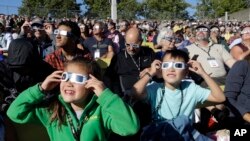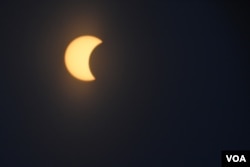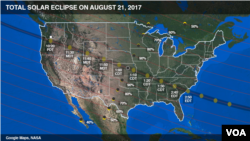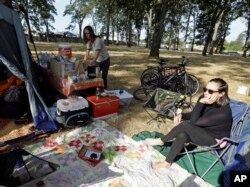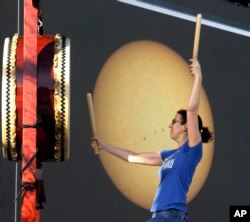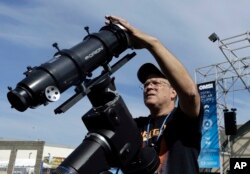Americans gazed in wonder through telescopes, cameras and protective glasses Monday as the moon began blotting out the midday sun in the first full-blown solar eclipse to sweep the U.S. from coast to coast in nearly a century.
“The show has just begun, people! What a gorgeous day! Isn’t this great people?” Jim Todd, a director at the Oregon Museum of Science and Industry, told a crowd of thousands at an amphitheater in Salem, Oregon, as the moon seemed to take an ever-bigger bite out of the sun.
The celestial show was expected to be the most observed and photographed eclipse in history, with millions staking out prime viewing spots and settling into lawn chairs to watch, especially along the path of totality — the projected line of shadow created when the sun is completely obscured. The path was 60 to 70 miles (96 to 113 kilometers) wide, running from Oregon to South Carolina.
With 200 million people within a day’s drive from the path of totality, towns and parks braced for monumental crowds. Clear skies beckoned along most of the route, to the relief of those who feared cloud cover would spoil this once-in-a-lifetime moment.
Astronomers were giddy with excitement. A solar eclipse is considered one of the grandest of cosmic spectacles.
The Earth, moon and sun line up perfectly every one to three years, briefly turning day into night for a sliver of the planet. But these sights normally are in no man’s land, like the vast Pacific or Earth’s poles. This is the first eclipse of the social media era to pass through such a heavily populated area.
The moon hasn’t thrown this much shade at the U.S. since 1918. That was the country’s last coast-to-coast total eclipse. In fact, the U.S. mainland hasn’t seen a total solar eclipse since 1979 — and even then, only five states in the Northwest experienced total darkness.
Scientists said Monday’s total eclipse would cast a shadow that would race 2,600 miles (4,200 kilometers) through 14 states, entering near Lincoln City, Oregon, at 1:16 p.m. EDT, moving diagonally across the heartland over Casper, Wyoming, Carbondale, Illinois, and Nashville, Tennessee, and then exiting near Charleston, South Carolina, at 2:47 p.m. EDT.
Shawnee National Forest in southern Illinois was in line to see the longest stretch of darkness: 2 minutes and 44 seconds.
All of North America was on track to get at least a partial eclipse, along with Central America and the top of South America.
In the southern Illinois village of Makanda, population 560 and home of the Eclipse Kitchen, lawn chairs were out and excitement was building.
“More and more people are coming in all the time,” said Debbie Dunn, designated car parker for the day.
Joe Roth, an amateur photographer, traveled south from the Chicago area to Alto Pass, Illinois, to catch his first total solar eclipse — on his 62nd birthday, no less. He said the stars aligned for him — “a Kodak moment for me to cherish and experience.”
Kim Kniseley drove overnight from Roanoke, Virginia, arriving in Madisonville, Tennessee, before dawn to get a parking spot at Kefauver Park, where by sunrise dozens of folks had claimed benches and set up tents.
He said he could have stayed home in Roanoke and seen a partial eclipse of 90 percent, but that would have been like “going to a rock concert and you’re standing in the parking lot.”
NASA and other scientists were in position to watch and analyze from telescopes on the ground and in orbit, the International Space Station, airplanes and scores of high-altitude balloons beaming back live video.
From aboard the space station, NASA astronaut Jack Fischer tweeted out a photo showing about a dozen cameras ready for action.
“All hands (cameras) on deck for #SolarEclipse2017 today,” he wrote, adding: “Don’t forget to protect your eyeballs!”
Hundreds of amateur astronomers converged on Casper, Wyoming. Among them was Mike O’Leary, whose camera was outfitted with a homemade eclipse filter, its focus and aperture settings locked in with blue painter’s tape. He was there to log his ninth eclipse.
“It’s like nothing else you will ever see or ever do,” O’Leary said. “It can be religious. It makes you feel insignificant, like you’re just a speck in the whole scheme of things.”
Citizen scientists also planned to monitor animal and plant behavior as daylight turned into twilight and the temperature dropped. Thousands of people streamed into the Nashville Zoo just to watch the animals’ reaction.
Scientists warned people not to look into the sun without protection, except when the sun is 100 percent covered. Otherwise, to avoid eye damage, keep the solar specs on or use pinhole projectors that can cast an image of the eclipse into a box.
The next total solar eclipse in the U.S. will be in 2024. The next coast-to-coast one will not be until 2045.




